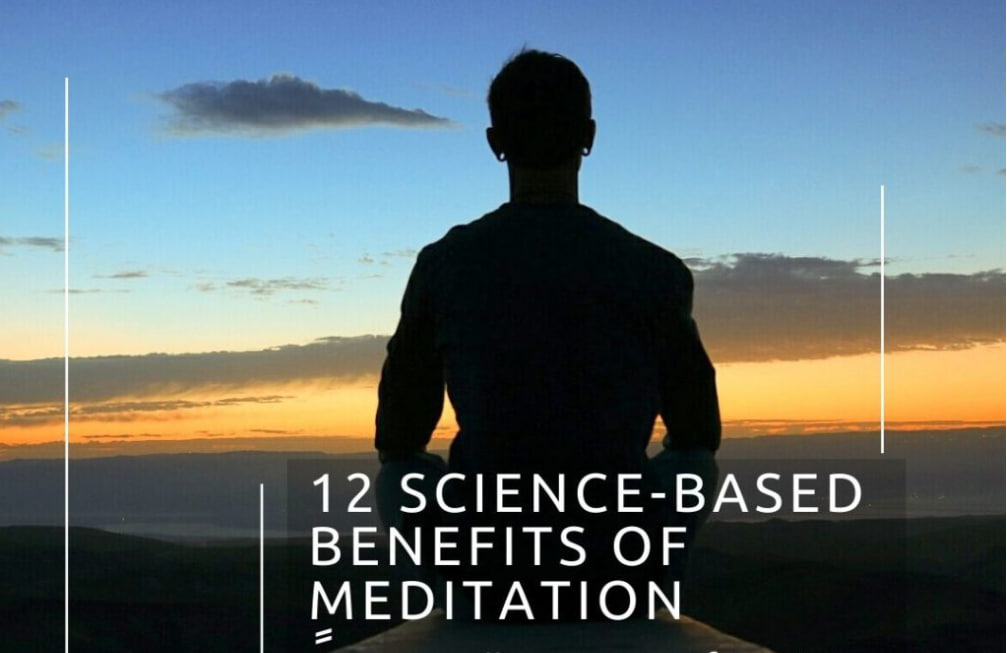Meditation Based on Science has been practiced for centuries and has gained popularity in recent years due to its numerous benefits. But what exactly is meditation and why is everyone raving about it? In simple terms, meditation is a practice that involves training the mind to focus and redirect thoughts, helping to achieve a state of mental clarity and emotional calmness. It can be done in various forms such as sitting, walking, or even while performing daily activities.
The concept of meditation may seem daunting at first, but with regular practice, it can become a valuable tool in managing stress, improving overall well-being, and enhancing self-awareness. In this article, we will delve deeper into meditation, its benefits backed by science, and how you can incorporate it into your daily routine.
Table of Contents
ToggleOutline: Meditation Based on Science

- Introduction to Meditation Based on Science
- The Science Behind Meditation
- Physical Benefits of Meditation:
- Reduces Stress and Anxiety
- Improves Sleep Quality
- Boosts Immune System
- Lowers Blood Pressure
- Mental Benefits of Meditation:
- Increases Focus and Concentration
- Enhances Self-Awareness
- Reduces Symptoms of Depression
- Improves Emotional Health
- Social Benefits of Meditation:
- Enhances Empathy
- Improves Relationships
- Promotes Kindness and Compassion
- Reduces Negative Emotions
- How to Start Meditating Based on Science:
- Setting Up a Comfortable Space
- Finding the Right Technique
- Making Time for Meditation
- Dealing with Distractions
- Types of Meditation:
- Mindfulness Meditation
- Transcendental Meditation
- Loving-Kindness Meditation
- Mantra Meditation
- Incorporating Meditation into Daily Life:
- Morning Routine
- Work Breaks
- Before Bedtime
- During Mealtimes
- Tips for a Successful Meditation Based on Science Practice:
- Patience and Consistency
- Breathing Techniques
- Body Positivity
- Non-Judgmental Attitude
- Challenges of Meditation Based on Science:
- Restlessness and Impatience
- Racing Thoughts
- Physical Discomfort
- Dealing with Negative Emotions
- Combining Meditation Based on Science with Other Activities:
- Yoga and Meditation
- Running
- Creative Activities and Meditation
- Journaling and Meditation
- Conclusion
Introduction to Meditation Based on Science

Meditation, in its simplest form, is the practice of training your mind to focus and redirect thoughts. It involves sitting or lying down in a comfortable position, closing your eyes, and focusing on your breath or a specific object or thought. While it may seem easy, meditation requires discipline, patience, and consistency to reap its benefits fully.
The origins of meditation can be traced back thousands of years to ancient Indian traditions, but it has been practiced across various cultures and religions. In recent years, scientific studies have shown the positive effects of meditation on our physical, mental, and social well-being, making it a popular practice in the modern world.
Meditation has been described as a state of consciousness where the individual achieves a sense of calmness, clarity, and inner peace. It allows us to detach from the constant chatter of our minds and be more present in the moment. With regular practice, meditation can help reduce stress and anxiety, improve focus and concentration, enhance self-awareness, and promote overall well-being.
The Science Behind Meditation Based on Science

In the past few decades, there has been an increasing interest in studying the effects of meditation on the human brain and body. Advances in technology, such as functional magnetic resonance imaging (fMRI), have enabled researchers to study the brain while in a meditative state. Through these studies, we now have a better understanding of how meditation affects our bodies and minds.
One of the most significant findings is that meditation can change the structure and function of the brain. Regular meditation has been linked to increased gray matter density in areas of the brain associated with memory, learning, and emotion regulation. It also helps strengthen neural connections and creates new pathways, resulting in improved cognitive abilities.
Meditation has also been found to affect our genes. A study conducted at Harvard Medical School found that after 8 weeks of regular meditation practice, participants had increased levels of telomerase, an enzyme associated with longevity. Meditation has also been shown to decrease the expression of inflammatory genes, slowing down the aging process and reducing the risk of age-related diseases.
Research has also shown that meditation can alter brainwave patterns, promoting a relaxed and calm state of mind. It has been linked to increased alpha and theta waves, which are associated with deep relaxation and creativity. These changes in brain activity can help reduce stress and anxiety levels and improve emotional well-being.
Overall, the science behind meditation is fascinating and continues to expand as more studies are conducted. The evidence-backed benefits make it a valuable tool for promoting overall health and well-being.
Physical Benefits of Meditation Based on Science

While the primary goal of meditation is to achieve mental clarity and emotional calmness, it also has numerous physical benefits. Here are some ways meditation can positively impact your physical health:
Reduces Stress and Anxiety
In today’s fast-paced world, stress and anxiety have become prevalent, affecting people of all ages. Chronic stress can lead to a wide range of physical health issues, such as high blood pressure, heart disease, and obesity. Studies have shown that regular meditation can help reduce stress levels and lower symptoms of anxiety disorders.
Meditation helps activate the parasympathetic nervous system, also known as the “rest and digest” response, which helps relax our bodies and reduce stress. It also lowers the levels of cortisol, a hormone released during times of stress, in the body. A study published in the Journal of Health Psychology found that meditation can decrease cortisol levels by up to 51%.

Improves Sleep Quality
Lack of sleep or poor sleep quality can have severe consequences on our physical and mental health. Research has shown that meditation can help improve sleep quality, especially for people with insomnia.
By promoting relaxation and reducing stress, meditation can help calm an overactive mind, making it easier to fall asleep. It can also help enhance melatonin secretion, a hormone that regulates the sleep-wake cycle. A study conducted at the University of Southern California found that mindfulness meditation can improve sleep quality in older adults.
Boosts Immune System
Our immune system plays a vital role in protecting us from illnesses and infections. Studies have shown that regular meditation can boost the immune system by increasing the activity of natural killer cells, which fight viruses and cancer cells.
Meditation can also reduce inflammation, which is linked to chronic diseases such as heart disease, diabetes, and cancer. A study conducted at the University of Wisconsin-Madison found that individuals who practiced mindfulness meditation had lower levels of pro-inflammatory genes compared to those who did not meditate.
Lowers Blood Pressure
High blood pressure, also known as hypertension, is a major risk factor for heart disease, stroke, and kidney disease. Research has shown that meditation can help lower blood pressure levels, making it an effective tool for managing hypertension.
Studies have found that meditation activates the vagus nerve, responsible for regulating heart rate and blood pressure. This can lead to a decrease in blood pressure levels and promote overall cardiovascular health. Another study published in the American Journal of Hypertension reported that participants who practiced transcendental meditation had lower blood pressure levels compared to those who did not meditate.
Mental Benefits of Meditation
Meditation has been used for centuries to promote mental well-being and inner peace. Here are some ways meditation can improve our mental health:
Increases Focus and Concentration
With the constant distractions in our daily lives, maintaining focus and concentration can be challenging. Regular meditation practice can help improve our ability to concentrate and stay focused on tasks.
Meditation involves training the mind to focus on a specific object or thought, such as the breath. This helps strengthen our attention muscle, making it easier to maintain focus for more extended periods. A study conducted at the University of Washington found that mindfulness meditation improved participants’ ability to focus and reduced mind-wandering.
Enhances Self-Awareness
Self-awareness is the ability to recognize and understand our thoughts, feelings, and emotions. It plays a crucial role in our personal growth and development. Studies have shown that meditation can help increase self-awareness by allowing us to observe our thoughts without judgment.
By practicing mindfulness, we can learn to be more present in the moment and observe our thoughts and emotions without getting swept away by them. This leads to a deeper understanding of ourselves, our patterns of thinking, and how they affect our actions. A study published in the journal Mindfulness reported that individuals who practiced meditation had increased self-awareness and emotional intelligence.
Reduces Symptoms of Depression
Depression is a mood disorder that affects millions of people worldwide. It can lead to decreased energy, loss of interest in activities, and feelings of hopelessness. Research has shown that meditation can be an effective tool in managing symptoms of depression.
Studies have found that meditation can decrease the activity in the default mode network (DMN), responsible for self-referential thinking and mind-wandering. This can help break patterns of negative thinking associated with depression. A 2018 study published in JAMA Network Open reported that mindfulness meditation can be as effective as medication in treating symptoms of depression.
Improves Emotional Health
Our emotional well-being plays a significant role in our overall happiness and satisfaction with life. Regular meditation practice has been linked to improved emotional health by reducing negative emotions and promoting positive ones.
Meditation helps us observe our thoughts and emotions without getting caught up in them, allowing us to let go of negative emotions and cultivate positive ones. Studies have shown that mindfulness meditation can reduce symptoms of anxiety, stress, and anger while improving feelings of joy and well-being.
Promotes Kindness and Compassion
Kindness and compassion are qualities that can positively impact not only those around us but also ourselves. Studies have shown that meditation can promote feelings of kindness and compassion towards oneself and others.
Through loving-kindness meditation, we can cultivate a kinder and more compassionate mindset by generating positive emotions towards ourselves and those around us. This can lead to a more positive outlook on life and improved relationships with others.
Reduces Negative Emotions
Negative emotions such as anger, jealousy, and resentment can affect our well-being and relationships. Meditation has been found to reduce negative emotions by helping individuals observe their thoughts and emotions without getting caught up in them.
By developing a non-judgmental attitude towards our thoughts and emotions, we can learn to let go of negative ones and cultivate more positive emotions. A study published in the journal Mindfulness reported that mindfulness meditation can reduce symptoms of anxiety, stress, and depression while increasing positive emotions.
How to Start Meditating
Now that we’ve explored the various benefits of meditation, you may be wondering how to get started. Here are some tips to help you begin your meditation practice:
Setting Up a Comfortable Space
It’s essential to create a comfortable space where you can meditate without distractions. Find a quiet and clutter-free area where you won’t be disturbed. You can also use candles, incense, or essential oils to create a calming atmosphere.
Finding the Right Technique
There are various meditation techniques, and it’s important to find one that works for you. Some popular forms of meditation include mindfulness meditation, transcendental meditation, loving-kindness meditation, and mantra meditation. You can try out different techniques to see which one resonates with you.
Making Time for Meditation
Meditation is a practice that requires consistency to reap its benefits. Set aside a specific time each day to meditate, whether it’s in the morning, during breaks at work, or before bedtime. It’s essential to make it a regular part of your routine.
Dealing with Distractions
Distractions are inevitable, especially when you’re first starting with meditation. The key is to acknowledge the distraction without judgment and gently bring your focus back to your breath or chosen object of meditation. With practice, you’ll be able to let go of distractions more easily.

Types of Meditation
As mentioned earlier, there are various types of meditation, each with its unique approach and benefits. Here are some popular forms of meditation:
Mindfulness Meditation
Mindfulness meditation involves focusing on the present moment, observing our thoughts and emotions without judgment. It can be done by focusing on the breath, body sensations, or sounds in the environment. Regular practice can help increase self-awareness, reduce stress, and improve emotional well-being.
Transcendental Meditation
Transcendental meditation (TM) is a form of meditation that involves silently repeating a mantra, a word or phrase, to achieve a state of relaxation and calmness. Research has shown that TM can help reduce stress, anxiety, and depression while promoting overall well-being.
Loving-Kindness Meditation
Loving-kindness meditation (LKM) involves generating feelings of kindness and compassion towards oneself and others. This practice can help cultivate empathy, improve relationships, and promote positive emotions.
Mantra Meditation
Mantra meditation involves chanting or silently repeating a mantra to achieve a state of calmness and relaxation. The mantra can be a word or sound that holds significance for the individual. Regular practice can help reduce stress, improve focus and concentration, and promote emotional well-being.
Tips for a Successful Meditation Practice
Like any new habit, developing a consistent meditation practice may come with its challenges. Here are some tips to help you make the most of your meditation sessions:
Patience and Consistency
Meditation takes time and patience to master. Don’t get discouraged if you find it challenging at first. With regular practice, you’ll notice improvements in your ability to focus and stay present.
Breathing Techniques
Focusing on the breath is a common technique used in meditation. Paying attention to the inhale and exhale can help calm the mind and relax the body. You can also try different breathing techniques, such as deep breathing or alternate nostril breathing, to enhance your meditation practice.
Body Positivity
It’s essential to find a comfortable position while meditating, whether it’s sitting cross-legged on the floor, using a cushion, or even lying down. Acknowledge any discomfort you may feel without judgment and adjust your position accordingly.
Non-Judgmental Attitude
One of the key principles of mindfulness is cultivating a non-judgmental attitude towards our thoughts and emotions. While meditating, it’s normal for your mind to wander or for negative thoughts to arise. The key is to observe them without judgment and gently bring your focus back to your breath.
Challenges of Meditation
While meditation has numerous benefits, it may not come easy at first. Here are some common challenges you may face while meditating:
Restlessness and Impatience
Sitting still and focusing on the breath can be challenging for those new to meditation. It’s normal to feel restless and impatient, but with practice, you’ll learn to sit with these feelings and stay present.
Racing Thoughts
Our minds are constantly bombarded with thoughts, and it can be challenging to quiet them down during meditation. It’s essential to acknowledge these thoughts without judgment and bring our focus back to the breath.
Physical Discomfort
Sitting in one position for an extended period can lead to physical discomfort. If you experience any pain or discomfort, try adjusting your position or using cushions for support. You can also incorporate stretching or yoga into your daily routine to improve flexibility and make meditation more comfortable.
Dealing with Negative Emotions
Meditation can sometimes bring up negative emotions that we may have been suppressing. It’s important to be gentle with yourself and acknowledge these emotions without judgment. With regular practice, you’ll learn to let go of negative emotions and cultivate positive ones.
Combining Meditation with Other Activities
While meditation can be a standalone practice, it can also be combined with other activities to enhance its benefits. Here are some examples:
Yoga and Meditation
Yoga is an excellent way to move your body and prepare it for meditation. The combination of physical movements and mindfulness can help improve flexibility, reduce stress, and promote overall well-being.








